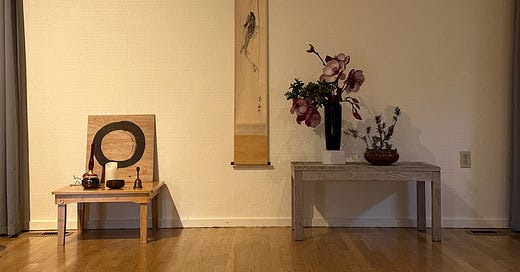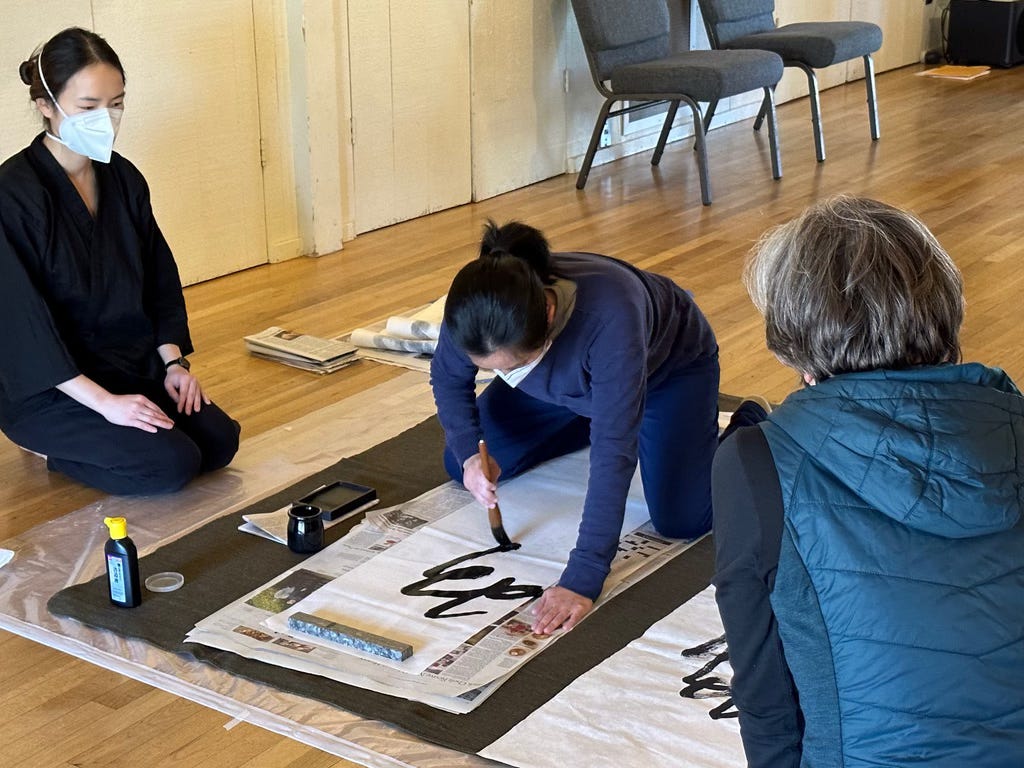Blessings for Lunar New Year and Year of the Snake :) This time of year I usually head to Sonoma for a week of Zen practice. However, this year I have other work to be done, so it is still time for practice, even if in a different form - and thus, the fourth and penultimate installment of Temple Arts recalls how I found my way to Zen - a very unexpected and very fitting part of my journey in traditional practices.
Zen
My Zen teacher Norma Wong is a strategist, and as such, I met her through an old job. She held trainings at a retreat center in Sonoma about once a year, with lectures on purpose, plans, and partnerships interspersed with meditation, calligraphy, and mopping the floors with our feet. Everyone in attendance would practice a handful of ways to care for the grounds of a temporary temple while gently building our internal core muscles. A visitor scouting for their event happened upon our group sweeping, slightly perplexed, “I’ve never seen so many landscapers for one venue.”
In a sunlit meeting room with no tables or shoes, we sat on floor cushions and chairs while Norma sat on a bench, cross-legged, telling stories and answering questions – with a clock (not a phone) and tea mug at her side. Behind her, a changing floral arrangement she set each day. Her stories of Hawaii, her home, and being seated on the floor reminded me so much of Thai temple meetings. I approached her during a break and told her about the Queen Mother of Thailand saying, “One day Siam will remember its strength again, instead of losing its soul to other nations.” She proceeded to tell us a story about nations and peoples who have or haven’t taken up arms to stop a takeover. It ended with, “it is not only a matter of taking up arms. What is more important is that we do not forget.” It was then I got an inkling that my work would be about not forgetting.
Her teachings gave the arts I’d practiced applications beyond temple use. I emailed her with a few questions each year for the next five years before I clumsily asked to be a Zen student, still unsure of myself. I already belonged to two schools, and a third might be overdoing it. My Taiji teacher already scolding me on what was, to him, my wavering commitment whenever I missed practice to attend her trainings. That was my foray into crossing loyalties within martial arts culture. To which Norma said, “I’m not a martial artist,” and that the Taiji I practiced wasn’t at odds with Zen practices. There were also a few “operational differences” between Thai Buddhism and Zen. Monks in both traditions have these shoulder bags meant for receiving alms and food from devotees. Except in Zen, they were no longer in use, just symbolic pouches worn during formal services. It felt wrong to me to be with a monk without making an offering, so I just as clumsily offered to bring her food. Suffice it to say, she declined. The food, that is. Not my request to be a student. Upon parting, she said, “we’ll go at the pace of your appetite.”
It turns out that was just weeks before pandemic lockdown. We were all confined to quarters from Covid, and all my teachers didn’t skip a beat – doing what was necessary to keep their temple schools running. I took to the kitchen trying my hand at homemade tofu, pickling, and reverse engineering my mother’s childhood eats from scratch. My email correspondence with Norma picked up in frequency, and we alternated between life choices and cooking concepts: simmering, potency, subtlety. I joked that she was more art director than advisor. The pandemic marked the first time in nearly twenty years that I was without a physical practice community. I wrote to her, “I miss all the temples in my life. These makeshift Zoom ones are pretty good, and the one inside me, not so bad either.” I felt a pang of emptiness at the thought of a temple-less life, and realized that many lives are temple-less. Over the years, with continued study (old Buddhist and Chinese texts) and further practice (more mopping and meditation), I began to understand the imperative of remembering temple ways. I had the fortune and privilege of being brought up in them, and thus, I have a responsibility.
When I asked her about being in multiple communities, my roles in them, and practicing on my own, she said that purpose helps us navigate while communities keep us from the delusion and ego of individual effort. And, “no one can practice for us.” Upon reuniting in-person, I had some puerh tea and asked her for steeping instructions – after a poor attempt doing it by myself and drinking a cup of what tasted like tree bark. This time, she took a look at my third brew, “Not dark enough.”
Photo credit: Pam Omidyar





